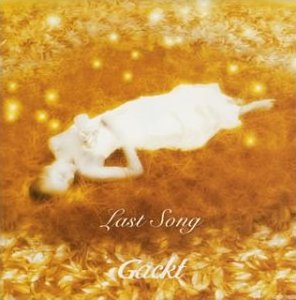
Mars is the first full-length studio album released by Japanese solo artist Gackt. It was released on April 26, 2000.

The Seventh Night: Unplugged is a compilation album released by Gackt on May 26, 2004. It contains acoustic arrangements of previously released songs and complements The Sixth Day, a single collection released three months earlier. The unplugged theme of The Seventh Night would be continued by Gackt's subsequent album, Love Letter.

Moon is the third full-length studio album released by Japanese solo artist Gackt on June 19, 2002. Instead of a booklet, the concept album comes with a printed note by the artist, asking readers to "sense" the record's story, rather than analyzing the lyrics. The booklet was eventually included in the packaging of Moon's 2003 follow-up Crescent. Both albums are linked, as well as his more recent albums Diabolos and Last Moon from the "Moon Saga".

Crescent is the fourth full-length studio album released by Japanese solo artist Gackt on December 3, 2003. It is a concept album linked to its predecessor Moon and comes with booklets for both records. Crescent also features a duet with L'Arc-en-Ciel vocalist Hyde for "Orenji no Taiyou" with whom Gackt co-starred in the 2003 movie Moon Child.

Love Letter is the fifth full-length studio album originally released by Japanese solo artist Gackt on February 14, 2005 in Japan.

"Redemption" is a single released by Japanese musician Gackt on January 25, 2006. Its songs "Redemption" and "Longing" were theme songs of the video game Dirge of Cerberus: Final Fantasy VII.

"Vanilla" is a second single released by Gackt on August 11, 1999. It peaked at fourth place on the Oricon Singles Chart and charted for ten weeks. It is Gackt's second best selling single, with 248,360 copies sold. "Vanilla" was re-released on March 20, 2002, when it peaked at number twelve and charted for 6 weeks. It was ceritifed gold by RIAJ.

The discography of Japanese R&B singer Misia consists of nine studio albums, three compilation albums, one extended play (EP), one live album, six remix albums, twenty-six singles, twelve promotional singles, eighteen video albums and thirty-seven music videos. In 1997, Misia signed a recording contract with BMG Japan and joined the then up-and-coming talent agency, Rhythmedia. Under the sub-label Arista Japan, Misia released her first single, "Tsutsumikomu Yō ni..." in February 1998, followed by "Hi no Ataru Basho" in May. In June, her debut album, Mother Father Brother Sister, opened at number three on the Oricon chart. The album peaked at number one three weeks later and stayed in the top five for eleven consecutive weeks. Mother Father Brother Sister was certified double million and won a Japan Record Award for Best Album, as well as a Japan Gold Disc Award for Pop Album of the Year. In 2000, Misia's second studio album, Love Is the Message, debuted at number one and was certified double million. It won a Japan Record Award for Best Album and a Japan Gold Disc Award for Pop Album of the Year. The album spawned three top ten hits: "Believe," "Wasurenai Hibi" and "Sweetness." Misia's first remix album, Misia Remix 2000 Little Tokyo, was released three months later and shot to number one. It sold over 800,000 copies and is the second best-selling remix album of all time in Japan.
The discography of Mika Nakashima includes 11 studio albums, 7 compilation albums, 45 singles and 20 video albums. These have all been released through Sony Music Entertainment Japan.

"Metamorphoze" is a single released by Gackt on May 25, 2005 under Nippon Crown.

"Last Song" is a single released by Gackt on November 12, 2003 under Nippon Crown. It peaked at fifth place on the Oricon weekly chart and charted for 13 weeks. It was certified gold by RIAJ. An unplugged piano-only version was recorded, and music video filmed, for The Seventh Night: Unplugged.

"Black Stone" is a single released by Gackt on April 27, 2005 under Nippon Crown. It peaked at third place on the Oricon weekly chart and charted for seven weeks. It was certified gold by RIAJ.
The discography of Japanese singer Mai Kuraki consists of fifteen studio albums, six compilation albums, twenty-three video albums, three remix albums, fifty-six singles, and sixteen promotional singles. Kuraki debuted in 1999, while she was still in high school, through Giza Studio. The label initially marketed Kuraki in the United States under the name Mai K, and released the single "Baby I Like" (1999). However, the single was a commercial failure which prompted the label to send her back to Japan. There, they released her single "Love, Day After Tomorrow", which peaked at number two on the Oricon Singles Chart and was certified million by the Recording Industry Association of Japan (RIAJ). The second single, "Stay by My Side" became her first number one single on the chart. Kuraki's debut album, Delicious Way, topped the Oricon Albums Chart and was certified triple million by the RIAJ.

"Kimi ni Aitakute" (君に逢いたくて) is a single released by Gackt on October 27, 2004 under Nippon Crown. It peaked at second place on the Oricon Singles Chart and charted for seventeen weeks. In 2004, it was the 96th best selling single of the year, with sales of 98,335 copies. It ultimately sold 124,280 copies, making it Gackt's ninth best selling single. It was certified gold by RIAJ.

"Jet Coaster Love" is the third Japanese single of South Korean girl group Kara. The single was originally set to be released on March 23, 2011, but following the 2011 Great Tohoku Earthquake and tsunami disaster in Japan, the physical single was rescheduled to April 6, 2011. In order to help out the areas affected by the disaster, the group had decided to donate all proceeds from the sales of this single, both physical and digital, to relief efforts. It eventually became the group's first single to reach #1 on Oricon Daily and Weekly charts.
Kis-My-Ft2 is a six-member Japanese boy band under Johnny & Associates, with members Kento Senga, Toshiya Miyata, Wataru Yokoo, Taisuke Fujigaya, Yuta Tamamori and Takashi Nikaidō.

Girls Forever is the third Japanese studio album and sixth overall studio album release by South Korean girl group Kara on November 14, 2012, in four different editions.
The discography of Chihiro Onitsuka consists of six studio albums, one cover album, five compilation albums, 20 singles and seven video albums. These were released under Toshiba EMI between 2000 and 2003, Universal Music Japan from 2004 to 2010, For Life Music Entertainment from 2011 to 2012, and on her personal record label, Napoleon Records, from 2013.
Japanese singer and songwriter Miliyah Kato has released eleven studio albums, six compilation albums, two EPs, one remix album, one cover album, one tribute album, 51 singles, and 15 promotional singles. She has sold over 9 million records in Japan, making her one of the best-selling and most-downloaded artist in the country of all time. Kato has been named as "the charisma of the high school girls" and "the queen of the unrequited love songs" by several media.

Thank You, Love is the third studio album by Japanese singer and songwriter Kana Nishino. It was released on June 22, 2011. Nishino acted as the album's primary lyricist, as she had on all of her preceding albums. Thank you, Love was created with the concept of a "warm album" and reflects Nishino's desire to create a work that includes positive elements. Thank you, Love marked new lyrical directions for Nishino: while LOVE one. and To Love were solely centered on songs about romance, this work is unique in that it expresses things other than that.















